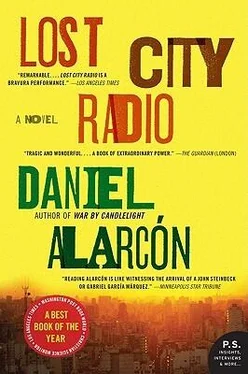Norma and Victor walked out onto the sand. She didn’t reach for his hand, as she had in the taxi, though she had an urge to. Instead, she watched him as he bounded ahead, almost to the water’s edge and back. He spun and waved his arms. She followed him toward the water and stopped just where the sand became moist and mushy. It had been years since she came to the beach, since she was a girl. Had she ever come in winter? It seemed possible that she never had. Norma took off her shoes, rolled up the cuffs of her pants, and stepped into the wet sand with one foot. She pressed firmly into the cool earth, and it felt good. She pulled her foot back to the dry sand, and crouched to admire her work: a perfect imprint of her foot. She made another, just ahead, and walked this way to where the waves spread out over the sand, a thin skin of advancing and retreating water. Then she retraced her steps, walking backwards. There it was: her disappearance. She had walked into the ocean and not come back.
As a girl, she’d spent an afternoon at this beach, carving massive footprints, giant paw-prints, around her father, while he slept with a straw hat slung low over his eyes. How old was she then? Eight? Nine? Norma smiled. Her mother, she recalled, wore a black bathing suit and hat with a dramatic, swooping brim. A bow, perhaps. She’d had the air of a movie star, thought herself much too elegant to swim, so she alternately read or smoked or stared off at the sea. Norma crawled in the hot, bright sand around her parents, carving a trail of strange footprints. She lost herself in it: the curve and sharpness of the claws, the heft of the heel. She filled her plastic bucket with seawater, wetting the sand so it would stick. When her father finally woke, Norma showed him her work. She was serious and determined. The beast she had imagined as she worked was terrifying and vicious. “A strange animal came while you were sleeping, Daddy,” she said. “He had fangs and claws.”
He took the cigarette that Norma’s mother offered him. He squinted at the footprints around him. “What did the animal do?”
“He ate you whole.”
Her father looked at her, feigning worry. “Am I dead then?”
She told him he was, and he laughed.
A gust of wind blew sand in her face, and she realized Victor had been talking. His teacher had come with him all the way to the city. They’d left 1797 a few days before, been together all the way to the central bus station in the capital. Then Manau walked Victor to the radio station and left him there. Norma nodded: it was inexplicable, cruel. To abandon a boy in the city, to leave him to fend for himself? And just as inexplicably, Victor seemed to hold no grudges. Why did Manau leave?
“He was home,” Victor said, as if it were that simple. Of course, Manau left me, Victor said. Of course: he was heartbroken.
Norma sat on the sand and stretched her legs in front of her. Victor ran off and returned a few minutes later, carrying an armload of driftwood and kelp and a tin can of mysterious origin, rust blooming at its edges. This forgiving boy, this Buddha — he was panting, out of breath, his face flush. “It’s pretty,” he said. “Isn’t it?”
She smiled. It wasn’t clear if he meant the ocean, the sand, or his collection of debris, but in any case, Norma felt it impossible to disagree with the boy about this or anything.
THE DIRTY sand, the lightless horizon — these details couldn’t obscure the beauty of what lay before him: endless water. It moved, it was alive: its briny smell, its mottled surface of foam and breaking waves, an infinity of water and surf, rising, falling, breathing. The ocean simply could not disappoint.
Everything had been tinged with green, the bodies and hands and faces of everyone in 1797. His mother was there, too — he was sure of it — but beyond this, his dream had left him nothing: a bitter taste in his mouth, perhaps, but no image to be interpreted, no narrative to untangle. Back home, there was an old woman who interpreted dreams. She claimed to have lived with the Indians deep in the forest, claimed to know their language: medicine , she told Victor, and tree are the very same word. Victor had gone with his mother once to visit her, had waited outside, digging in the earth with a sharp stick. His mother paid the old woman with a bundle of dried tobacco and a half dozen silver fish.
“What was the dream about?” Victor had asked then.
“Your father,” she’d said, but hadn’t told him anything more.
Before they left this morning, Victor had asked permission to look through Norma’s bookshelves. He’d never seen so many books. He didn’t tell her he hoped to find a map of some sort and, on it, his village and its river. If he could trace its crooked and curving path to the sea, it might be possible. Which way did the river flow? These were things they had never learned. At home, tacked in the wood by the door, there was a map, yellowed with mold, its lines and colors fading. It was from before the war, with names, not numbers. His father’s map. But Victor couldn’t remember anything about it, except that when he asked his mother to point out their village, she had sighed.
“We’re not on it, silly.”
When he took the map down to show to his teacher, Manau looked at it and smiled. He pointed to the capital, traced the shoreline with his fingernail, then took his red pencil and scratched out the old name. To the left of the starred city, somewhere in the vast ocean, Manau printed the word ONE .
“What’s it like?” Victor had asked.
“Beautiful,” said Manau.
For homework that long-ago evening, Victor corrected his map, updating the names of the various cities with a mimeographed map Manau gave him, replacing each name with a number. The order of it became clear as he worked: less than three digits along the coast, below five thousand in the jungle, above that in the mountains. Odd numbers were usually near a river; evens near a mountain. Numbers ending in ones were reserved for regional capitals. The higher the last digit, the smaller the place.
At Norma’s, he thumbed through books and found nothing. Books on the history of radio, picture books of jungle plants, dictionaries for languages he’d never heard of. She sat in the kitchen while he blew dust off heavy leather tomes, turned the frayed, dissolving pages of books that hadn’t been opened in years. There were line drawings of birds and plants in notebooks of heavy parchment. Others had text so small that he could barely read them. Victor spent a moment with a graying book of faces, photos of young men and women in formal dress. Each page had a few faces crossed out, with a date beneath the picture. He looked for Norma, but when he couldn’t find her, he put the book away. Closing his eyes, Victor saw it again and again: his mother at the rock, now steady against the current, now floating away, now diving into the foamy waters. Which way did the river flow? When he’d come to the city, had he moved closer or farther from her? Had he followed her to the sea?
All day, he thought of the ocean. He imagined the word ONE inscribed somewhere in the sea. When they rode to the beach and he saw the size of it, he didn’t despair. It filled him with energy. He felt certain his mother was there. Now he sat beside Norma to gather his breath, and thought of his dream, and before him was so much water. Her eyes were on the surf, on the waves that broke at the horizon. He dropped his armload of stuff on the sand. “What do you have there?” she asked.
He showed her. “This,” he said, “is a sword.” He gripped the driftwood by its base and took a few swipes at the air in front of him. “See?”
She took it from him and, with florid strokes, carved her name in the air. “Dangerous. And this?”
Читать дальше












